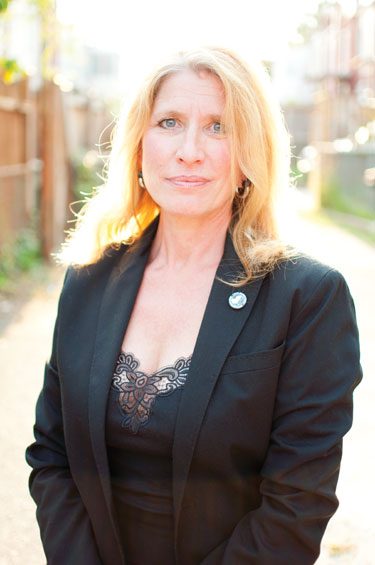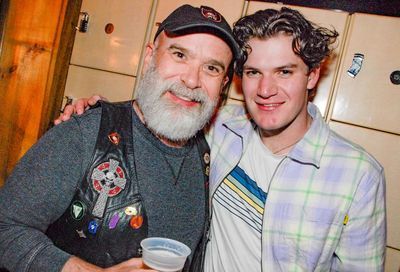Sexual Union
With a new book, Melinda Chateauvert aims to bring sex work out of the shadows and into the light of respectability

Mindy Chateauvert
(Photo by Todd Franson)
MW: Does the AP Style Manual specify anything related to the profession?
CHATEAUVERT: There’s been some debate on it. There’s been no rule that I’ve seen, although one of the bloggers who writes about usage and a New York Times reporter has spoken or has written about whether or not “sex worker,” versus “prostitute,” should be used. There was a little bit of pressure to start pushing The New York Times and other mainstream publications to use the term “sex worker” rather than “prostitute,” but that hasn’t become a universal rule, no.
MW: But the big LGBT organizations that a lot of LGBT people give to, are they using the term? Are they doing anything to help sex workers?
CHATEAUVERT: Some of the organizations are. The National Center for Transgender Equality — Executive Director Mara Keisling has been doing some really good work. Some of their statements have been very, very strong. Amnesty International has been very good. ACLU as a national organization has been very good, although not necessarily within its LGBT-equality arm, more in its international work, especially around violence and criminalization issues. The Task Force, in conversations that I’ve had with Executive Director Rea Carey, is beginning to pick up those issues and certainly has been fairly, if not having a specific project, has become more vocal, as we saw at Creating Change — more aware that addressing the issues of sex work are important for the LGBT community. I have nothing to say about HRC. [Laughs.]
MW: Doesn’t a lot of the stigmatization of sex work and sex workers go back to the United States’ Puritan beginnings?
CHATEAUVERT: A lot of people want to say that, and as a historian, one wants to base it within a Hawthorne/The Scarlet Letter/New England puritanism. I understand that that’s one way of situating the history of that stigma. However, I think it’s important to remember that prostitution was not a criminal offense in the United States until World War I. And most countries in the E.U., as well as other places around the world, abolished prostitution as a criminal offense after World War II.
MW: Do you have hope for progress?
CHATEAUVERT: I see a lot of progress happening. I think that this is a very complex movement. When we talk about decriminalization, what are we talking about decriminalizing? In fact, most workers in the sex industry work legal jobs. That’s the other part to remember. If you work in a strip club, if you’re an adult entertainer, if you are a performer in pornography, and all those other kinds of jobs that are involved or associated with it, that’s more than half of the people working in the sex industry. They’re already working in legal jobs.
MW: So now we just need to get the other half?
CHATEAUVERT: In some ways we are talking about the other half — actually less than the other half. The estimates are really hard to judge. For places like California, there are more than 500 registered businesses in the sex industry, each employing anywhere between two and over 1,000 people. That’s a very different kind of number than just saying, “Oh, we’re only talking about the people who stand on the streets at night and solicit from passing cars.” And it’s a very different picture.
MW: That raises a point from your book, about the crackdown on prostitution in Logan Circle here in D.C. Early in the book you write, “Neighborhood residents take false comfort in the belief that empty sidewalks discourage crime.” Can you explain what you mean by that?
CHATEAUVERT: The notion that empty streets means that there’s no crime, or leads to a lessening of crimes, actually means that there are fewer people out on the street, or participating and watching what’s going on out on the street — in order to, if you will, sound the neighborhood alarm. Or to alert people that a crime may be taking place.
We’ve got this very strange, “If you see something, say something” culture for every public place except when it comes to streets. And sex workers who work on the street are just as invested in not having muggers on the street, not having other people out there who are interested in doing violence against them, or robbing and stealing from them. They would like safe streets too! Civilians seem to think that the presence of people working on the street brings in other people who prey on them, or prey upon the people who live there. If there was better communication, if there was more openness between allowing sex workers to report people who are doing violence, or people who are breaking and entering, the situation would be very different. Instead, we “clean up the streets,” thinking that’s safer. Having more people on the streets is actually safer.
MW: You’re saying it’s similar to the “war on drugs,” and the way the police and neighborhoods deal with drugs: generally taking easy ways out rather than tackling the harder, more systemic issues.
CHATEAUVERT: Exactly. One of the things to remember is an experiment that happened in England — there’s also been small experiments here in the United States. When the cops de-prioritize the arrests of prostitutes and focus more on violent crime, especially violent crime against sex workers, they actually end up doing better in terms of arresting the people who are more dangerous criminals than by simply going after what [former New York Mayor Rudy] Giuliani liked to call “quality of life” crimes.
Last week I was talking to some folks who were doing organizing in the San Francisco area — this was South of Market, so still a somewhat transitional neighborhood in different kinds of ways. The residents were complaining to the police about the “screaming prostitutes and drag queens.” They were out on the streets disturbing their nights and the police weren’t doing anything to get them quiet or get them out of there. That’s a typical situation. What happened in this particular instance was that when the residents met with the police, members of the Sex Workers Outreach Project, SWOP Bay Area, which is a very active sex-workers organization, were also present. And when they started talking to the residents and the police, they started breaking down what was actually going on there.
The outcome of the story was that the residents realized that the screaming was actually about issues around domestic violence, around other kinds of structural violence that they were experiencing. Simply arresting them and taking them off the street, or pushing them into a new neighborhood, was not going to solve the very human social problems that they were actually facing. And so as an intervention to that, what they did was they worked out that anytime there was a neighborhood complaint that this was going on, they would send a small team of social workers and other SWOP advocates to go in and say, “Okay, what’s going on here? What do you need? Do you need health care? Are you about to overdose on a drug? Do you need help with your kids? Is this about some other kind of violence?” It showed that the issue was not sex work. The issues were the things that the sex workers were experiencing outside of their work. Their own personal/social problems.
MW: That gets to the idea that sex workers and sex work is not just a matter of the powerful vs. the powerless, of abusers and helpless victims.
CHATEAUVERT: Exactly. There’s a much broader and complex dynamic going on.
The thing about sex work is that some people do it by choice. Many engage in sex work because of circumstance. There are a lot of sex workers out there who have full-time, regular jobs, but then they do some escorting once or twice a month. Or maybe they go and work on the street at the end of the month because — guess what? — we just cut 6 billion dollars in food stamps. We just cut off TANF — Temporary Assistance for Needy Families. We kick people out of public housing because some member of the family has a drug conviction. We don’t allow people who have drug convictions to get financial aid to go to school or to do many other things. So what are they left to do? The ways that they can make money, the only way they can survive for many of them, is to choose to do sex work. Now, you might say that’s not quite the circumstances of choice. I mean, the choice is forced on them.
One of the things that I have told a lot of people who are very concerned about this notion around circumstance and sex work is, “Well, if you’re really interested in changing what prostitution looks like, what sex work looks like, and the people who engage in it, why don’t you work to support a living wage?” Because if we have living wages, there would be people who would not feel like they have to moonlight as sex workers.
MW: Let’s spend a few minutes talking about your background. I understand you fled to San Francisco from your native Iowa as a teenager.
CHATEAUVERT: I decided to drop out of high school because I was bored silly. I went to San Francisco for what I thought was going to be just a couple weeks — or so I told my mother. I ended up staying for two years and then decided that I needed to come back to Iowa. I did my GED and started as a freshman at the University of Iowa. I guess that would have been January 1979. And then just stayed in school. I finished my Ph.D. at Penn in ’92.
MW: In between you were at The George Washington University, where you started exploring and advocating for sex work in D.C., including advocating for strip clubs. Explain your work on behalf of strip clubs.
CHATEAUVERT: I was part of the D.C. Nighttime Coalition. I was working with Bob Summersgill and GLAA [the Gay and Lesbian Activists Alliance of Washington, D.C.], and one of the local restaurant organizations. We were trying to prevent the bill that basically abolished strip clubs in the city. It was all part of that gentrification of K Street and 14th Street, and later on was used to help shut down all of the clubs to build the stadium down by Tracks and Nation and all that. I was part of that. Then there was another proposal, another bill, which actually became “Prostitution-Free Zone” kind of legislation, and I testified against that, about local legislative policy about trying to create a public culture that was supportive of public sex basically. And I’ll use the term “public sex” because that throws a lot of people off. I don’t mean that people should be able to have sex on the street, but I do think that not trying to force it underground is healthier than the route that we’ve chosen to take.
Support Metro Weekly’s Journalism
These are challenging times for news organizations. And yet it’s crucial we stay active and provide vital resources and information to both our local readers and the world. So won’t you please take a moment and consider supporting Metro Weekly with a membership? For as little as $5 a month, you can help ensure Metro Weekly magazine and MetroWeekly.com remain free, viable resources as we provide the best, most diverse, culturally-resonant LGBTQ coverage in both the D.C. region and around the world. Memberships come with exclusive perks and discounts, your own personal digital delivery of each week’s magazine (and an archive), access to our Member's Lounge when it launches this fall, and exclusive members-only items like Metro Weekly Membership Mugs and Tote Bags! Check out all our membership levels here and please join us today!





















